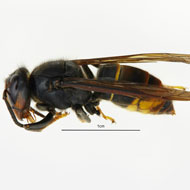
An Asian hornet has been found at an apiary in Devon, posing a potential risk to native honeybees.
This is the only confirmed sighting since the invasive species was first seen in the UK last year. A nest found in Tetbury, Gloucestershire, was promptly traced and destroyed by bee inspectors.
Asian hornets are smaller than our native hornets and pose no greater risk to humans than bees. However, they do prey on honeybees.
The hornet found in Devon is undergoing DNA testing at the National Bee Unit to establish how it came to be in the UK.
Work is underway to find and destroy any nests that may be present in north Devon, where the latest hornet was found. A local control centre will be opened this week and APHA bee inspectors will carry out surveillance and monitoring in a 1-2km radius around the initial sighting near Woolacombe.
Inspectors will track hornets and locate any nests using infrared cameras and traps. Nest disposal experts will offer support, using an approved pesticide to destroy any hornets found and remove their nests.
Nicola Spence, Defra’s deputy director for plant and bee health, commented: “Following the successful containment of the Asian hornet incursion in Gloucestershire last year, we have a well-established protocol in place to eradicate them and control any potential spread.
“We remain vigilant across the country, working closely with the National Bee Unit and their nationwide network of bee inspectors.”
Anyone who believes they have found a nest is encouraged not to approach it, but to report the sighting on the Asian Hornet App (available for free from Apple and Android app stores). Sightings can also be reported by email to alertnonnative@ceh.ac.uk with a photo, or via www.nonnativespecies.org.



 The Veterinary Medicines Directorate (VMD) is inviting applications from veterinary students to attend a one-week extramural studies (EMS) placement in July 2026.
The Veterinary Medicines Directorate (VMD) is inviting applications from veterinary students to attend a one-week extramural studies (EMS) placement in July 2026.